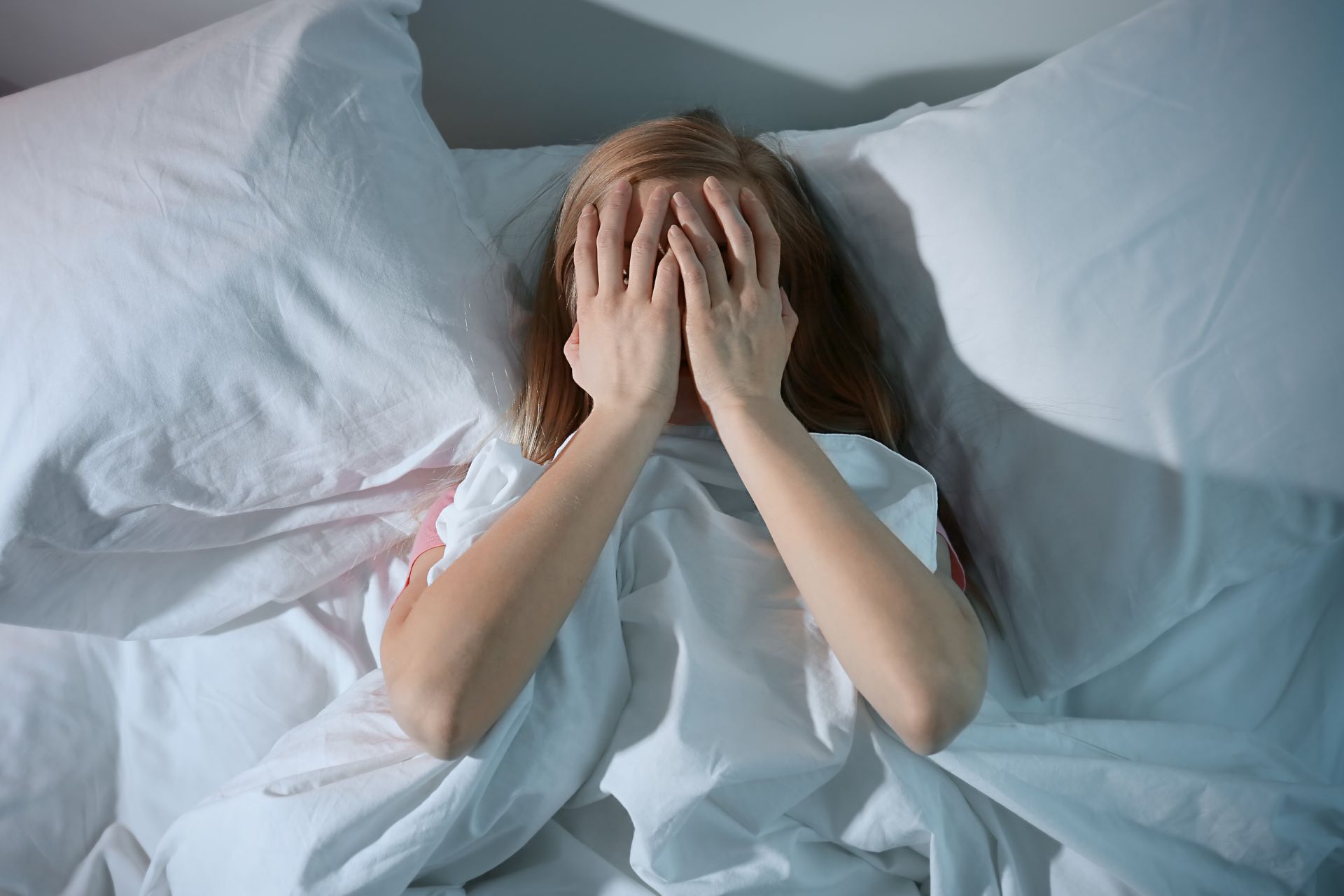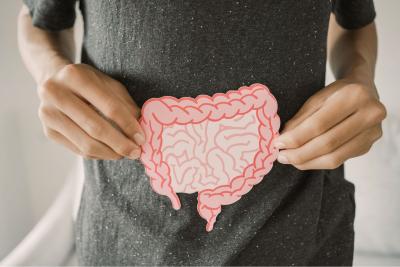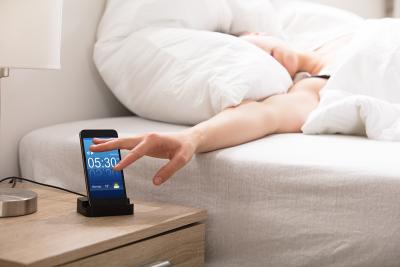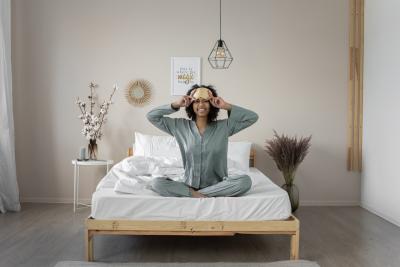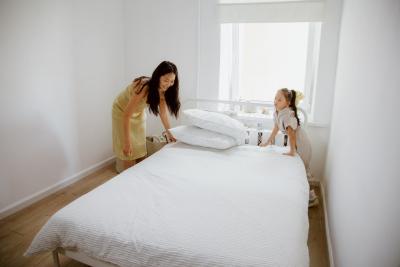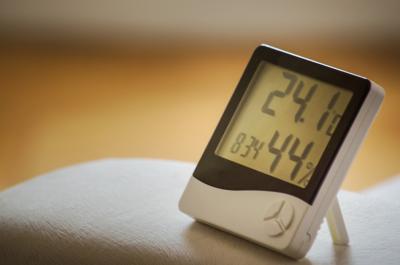Is there anything more annoying than when you're laid in bed, ready to drift off, but then you get the urge to move? Not only that but for some people, this urge is continuous and can lead to you almost rolling around in bed as you try to find a comfy position to fall asleep in.
As many of us know, tossing and turning at night is not uncommon, but it can be highly frustrating. So, to help you and your family get the rest you deserve, we've been chatting to leading sleep expert Karen Brammall, from Baby Sleep the Night, about some of the most common causes and how you can improve your chances of a wriggle-less night.

Why do we experience restlessness whilst trying to sleep?
The reasons that we can experience restlessness are varied, though some of the most common causes include:
- Your diet
- Your bed is uncomfortable
- Your room temperature is uncomfortable
- Your bedroom is too light
- You have aches or pain
- You need to use the bathroom
- You are stressed or anxious
- You have a condition, such as restless leg syndrome or sleep apnea
- You are sleeping in an awkward position – such as on your stomach
As we mentioned above, sometimes feeling restless whilst we're going to sleep is just because we can't get comfortable, but some medical conditions can cause this issue for some people. In particular, conditions including sleep apnea, insomnia and narcolepsy can induce restlessness when lying in bed or trying to sleep.
Obviously, a medical condition is something that a doctor would be able to assist you with, but for the easier causes there are plenty of ways to help. Comfort, in particular, can be a big issue that can cause restlnessness. As Karen told us:
"Comfort is essential for a good night's sleep, whatever age you are, and this can be broken down into several areas. In terms of temperature and environment, some of these things are down to personal preference, but, in general, we all sleep far better in darkness due to the hormonal effect that it has on the body. As well as darkness, cooler temperatures also aid these hormonal effects.
"Just like you wouldn't want to wear scratchy pyjamas, you also wouldn't want to sleep on a lumpy old mattress either, so comfort in this area is an important factor, and again personal preference between hard and soft beds varies wildly, as does how long they last, dependent on quality.
"With babies, though, it is essential to follow the safe sleeping guidelines in place to help prevent Sudden Infant Death Syndrome (SIDS), and second-hand mattresses are not recommended, no matter how clean and fresh they look. You should use a firm and flat cot mattress that is protected by a waterproof cover. This will help keep the mattress clean and dry, as the cover can be wiped down. You should also avoid using soft or bulky bedding, pillows, or cot bumpers as they all increase the risk of SIDS."

How to get rid of restlessness
So, we now know what causes our tossing and turning, but how can we end our restlessness for good? Well, Karen suggests:
"Sleep is a cyclical process, and we all wake several times throughout the night; it's the normal science of sleep, and we won't ever change that. If a child is reliant on something 'external' to fall asleep at the beginning of the night, then when they wake at one of these natural intervals which occur at the end of a sleep cycle, they simply don't understand how to get back to sleep without the 'prop' that they had at the onset of sleep.
"Putting them into their cot or bed wide awake and allowing them to settle themselves to sleep will ultimately solve the problem. It can be met with some objection, and it's easy for parents to second guess themselves during this process, which is where I come in and teach families how to do it once and do it right.
"Adults do this to a degree, too; if you rely on watching TV to fall asleep, then you'll be more restless in the night. So, avoid this kind of stimulation unless you want to be up all night watching it! A great bedtime routine is beneficial for children and adults alike; it's a cueing system for the brain and body that sleep is coming next on the list and prepares you nicely to fall asleep and sleep well. Most of us adults have one without realising it: brushing our teeth, getting undressed, etc., in the same order each night.
"Overtiredness is another classic cause of a restless night. When overtired, the body goes into a mild 'fight or flight' state – a leftover from our caveman days when if you were exhausted and fell asleep somewhere other than your cave, you may be in danger of being eaten by something!
If you're looking for some specific ideas to try, then why not try some of these methods?
Change your diet
If you're having vivid dreams or don't feel rested when you wake, what you eat and drink could play a part. Try to cut back on foods high in fat and sugar and drinks like coffee and alcohol. Instead, eat sleep-encouraging foods like salmon, bananas, cherries and walnuts, or drink milk or chamomile tea. Find out more about what foods can hamper your sleep in our article and the 10 foods you should eat to get quality sleep!
Invest in blackout blinds
As Karen mentioned, we all sleep better in the dark, but sometimes this isn't simple. If you work shifts or your bedroom window overlooks streetlights, we recommend investing in thick, quality-made blackout blinds. A sleep mask is also a great affordable option too! Light can be more influential on the quality of your sleep than you realise, with red light being linked to increased melatonin production and blue light found to hinder people's sleep.
With that in mind, make sure to not only invest in blackout blinds but optimise the lighting set-up in your bedroom to promote healthy sleep!
Journal every evening
If you think your restlessness is down to stress or anxiety, try journaling before bed or keeping a pad and paper in your bedside table. Getting your thoughts down on paper means you won't forget them and can relax more before nodding off. Another advantage to this is that you can note down what you're experiencing in terms of your body, which can be used to show to your doctor if you want to see if there's a medical diagnosis for your restlessness.
Purchase a new mattress
If your mattress is old, or simply isn't as comfortable as it used to be, then it might be time for you to invest in a new mattress. The good news is that we have plenty of mattresses to suit any bed and sleeper, so whether you're looking for an extra supportive orthopaedic mattress, want the custom contoured support of a memory foam mattress or want to buy a new kids mattress to support them as they grow, we have it all!
For more top tips on how to get rid of restlessness and to have better quality sleep, check out our post on 8 tips to get a good night's sleep

When to seek medical help
If you struggle to sleep and are restless for several weeks, which starts to influence other aspects of your life – for example, it's harming your memory or responsiveness – then we recommend speaking to your doctor or sleep consultant. If you are concerned about your child's restlessness.
Karen adds:
"There are conditions that can affect sleep, thankfully most of them rare. "The more common ones with signs to look out for would be a child who snores excessively. This can be due to ENT issues, which can cause obstructive sleep apnoea and should be checked out by a GP. A baby who makes whistling, raspy noises whilst breathing or sleeping should also be investigated as this could be due to laryngomalacia, a condition where the larynx is floppy."


